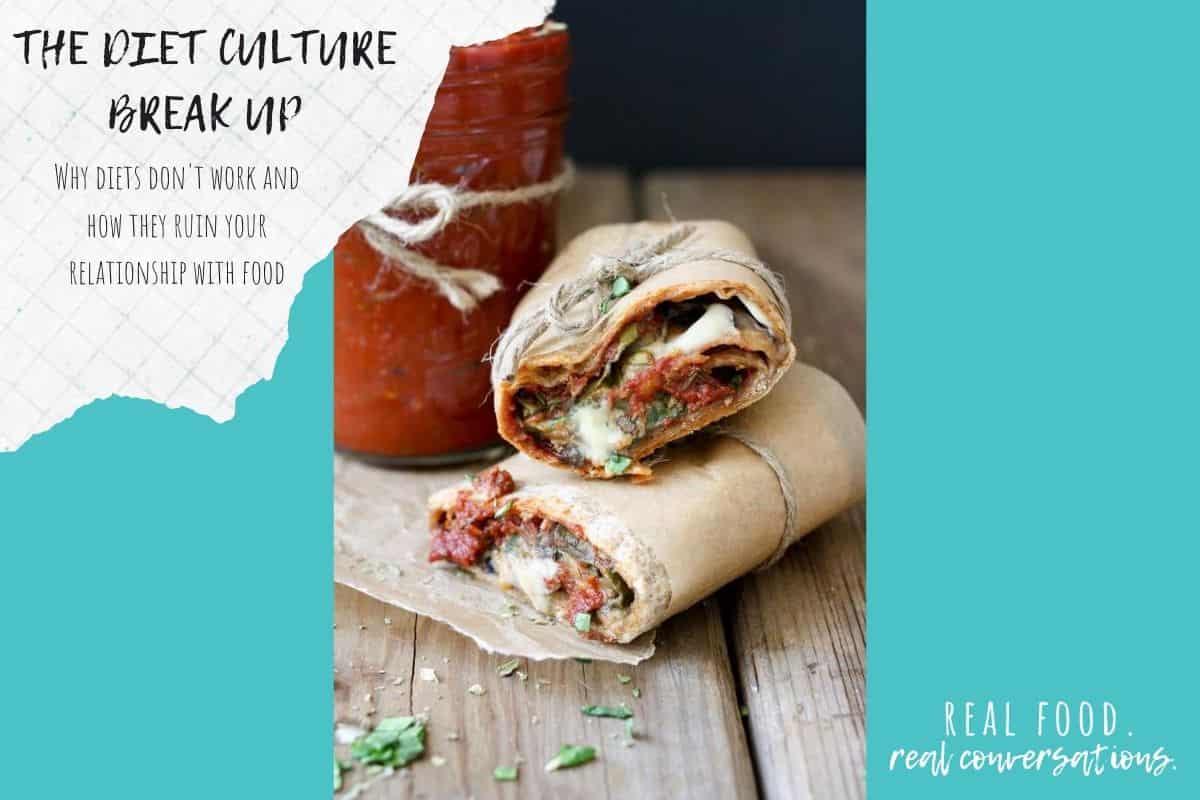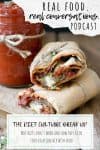Diet culture creates a system where you need to stay in a box in order to feel success, this hurts your relationship with food and is unhealthy overall.

How we surround ourselves when it comes to food greatly affects how we view it. It's so important to maintain a place of balance and not fall into the black and white extreme of diet boxes.
Podcast: Play in new window | Download | Embed Subscribe now! Apple Podcasts | iHeartRadio | TuneIn | Deezer | RSS | More
What is diet culture?
When you use the term diet, you are referring to a certain way a person eats and what they can or cannot have according to that diet's beliefs.
While this can be okay for some, diets often have stringent "rules" that when aren't followed attach emotions to food.
Feeling like a failure for eating something out of the zone of allowed foods is a common issue. As is restricting yourself from eating something you like that is not allowed.
This attaches emotions to food, and can create an unhealthy relationship. While having happiness and joy while you enjoy food is great, making sure that emotions don't define the food is important.
How to Combat Diet Culture
Diet culture can create a system that values weight and size over ones wellness. It can confuse your health with how you look.
In order to negate these issues, we need to start the journey to wellness, with how we feel inside versus how we look.
Asking ourself why we want to lose weight, do a certain exercise routine, eat a certain way is important. And that why needs to focus on an internal goal versus a visual goal.
The negative effects of dieting
While following a specific diet may help us lose the weight we wanted, there is a lot of negative that comes along with that.
The effects can be physical, as with many diets that are not sustainable long term you tend to gain back the weight. And sometimes even more.
This yoyo type fluctuation can take a toll on our bodies. Both physically and mentally. Which is why it's much more important to have a way of eating that is something you can stick to.
Diets don't work
This is kind of a bold statement but the truth of the matter is, when you follow a "diet" that has food rules and makes you feel like a failure, it is not going to work.
This is not sustainable long term. Human nature has us wanting to feel good about ourselves and when we are laden with guilt and failure it wears on us.
Some people are also emotional eaters so in order to feel comfort they turn to food. Then the guilt comes from failing to stay within the rules and it's a vicious cycle.
You gain more success when you don't establish labels on food as good or bad, in the rules or not. While eating a mostly wholesome diet is best for your health, eating things that you love is an important part of that!
Food Relationship
Your relationship with food is like your relationship with people. When it's not going well, when it's filled with negativity and guilt, then it's unhealthy.
Relationships with anything should make you feel happy, confident and non judged. You should feel free to do what works for you at any given time and still maintain the relationship.
So when we do things like give ourselves "rules" and follow stringent guidelines we are forming a relationship with food that isn't healthy for us and is not sustainable long term.
How to improve your relationship with food
In order to improve your relationship with food you need to remember a few things:
- There are no rules
- There is no food police
- You need to honor you
- Keep emotion out of it
- Don't put labels on food that are opinion based (meaning using words like "good," "bad," or anything that is based on an opinion versus fact like "nutrient rich.")
It's really important to keep reminding yourself that unless you need to avoid foods for medical reasons, you can and are allowed to eat what you want.
I like to focus on how I feel when eating certain things versus the emotion. Listen to your body. It's really good at telling you what it wants, we just aren't really good at listening!
When it comes to food labels, saying foods are "good" or "bad" leaves a lot of interpretation. These are words that are purely opinion based. What's good for one person isn't good for another.
I like to focus more on words that are factual, like wholesome or nutritious. Foods with nutrients give nutrition. That doesn't mean you can't eat foods that are not nutritious (those have a place in your diet as well!).
Healthy is a word that is controversial, I still use it because I consider healthy meaning good for the body AND mind, which means my favorite cookies and french fries are just what I need for my mind sometimes.
How to you break up with an unhealthy food relationship
It is so common to fall into the rabbit hole of diets, rules and strict boxes with eating. So if this is you, don't fret! You can make a change and it's easier than you think.
It's hard to change overnight, so take it slow. Your mind is conditioned for rules and strict guidelines so it will feel weird and you may even feel guilty for choosing to stop it.
Start with honoring small cravings. The more you do it, the better you will feel mentally. Once you actually feel how it is to honor your body and the guilt of food starts to separate, it will be easier!



Wendy
Could you describe an opinion based label?
veggiesdontbite
Hi Wendy! I went in and added more explanation to that. Thanks for asking! What I mean is using words to describe food that are based on opinion. Things like "good" or "bad" shouldn't be used to describe food unless you are stating your opinion on flavor or texture for example. So I won't tell my kids, "We don't eat that because it is bad." But I may say "Mommy doesn't like to eat that because it doesn't make her belly feel good." Instead I use words like "nutrient rich" to describe a food that is filled with nutritious things because while we love to eat nutrient rich foods we also love to eat those that are there simply for their delicious flavor and may not have many nutritious benefits. I still work on this every day!